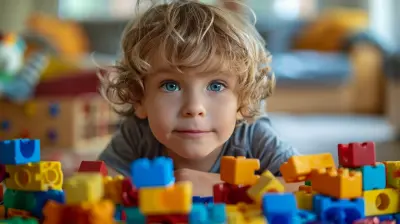27 November 2024
Emotions. We all have them, but understanding and managing them can be a totally different ball game, especially for children. As parents, caregivers, or educators, we often focus on teaching kids their ABCs, numbers, and how to tie their shoes. But what about teaching them how to navigate their emotions? This is where emotional intelligence (EI) comes into play, a skill that's just as important – if not more so – than academic smarts.
Emotional intelligence is essentially the ability to recognize, understand, manage, and influence our own emotions and the emotions of others. Imagine it as the foundation of a house. Without a strong emotional foundation, everything built on top of it can become shaky. The earlier this foundation is laid in childhood, the better equipped a child will be to handle life's emotional ups and downs. So, how do we build emotional intelligence in early childhood? Let’s dive deep into this essential topic.

What Is Emotional Intelligence (EI)?
Before we get into the "how," let's break down the "what." Emotional intelligence, often referred to as EQ (Emotional Quotient), is made up of five key components:1. Self-awareness – Understanding your own emotions.
2. Self-regulation – Managing those emotions in a healthy way.
3. Motivation – Channeling emotions toward achieving goals.
4. Empathy – Recognizing and understanding the emotions of others.
5. Social skills – Navigating social interactions and managing relationships.
These five components work together like the gears of a well-oiled machine. When one component is lacking, it can throw the whole system out of whack. Now, imagine teaching these components to a toddler or preschooler. Seems daunting, right? But it’s not as complex as you might think.

Why Is Emotional Intelligence Important in Early Childhood?
You might ask yourself, "Why is emotional intelligence so important for kids at such a young age?" Well, think about it this way: Emotions are the first language children speak. Before they can say "I’m hungry," they cry. Before they can say "I'm frustrated," they throw a tantrum. Emotions drive behavior at this stage of life, and without the ability to recognize and manage these emotions, children can feel overwhelmed.Benefits of Developing Emotional Intelligence Early:
- Better Communication: When children understand their emotions, they’re better able to express them. Instead of lashing out, they might say, "I’m upset because..." rather than just acting out.- Improved Relationships: Emotionally intelligent kids tend to have healthier relationships with peers, siblings, and adults. They’re more empathetic and understanding.
- Resilience: Life is full of challenges. Kids with high emotional intelligence are better equipped to bounce back from setbacks and disappointments.
- Academic Success: Believe it or not, emotional intelligence has been linked to better academic performance. Children who can manage their emotions are more focused, less anxious, and better at problem-solving.

How Can We Foster Emotional Intelligence in Early Childhood?
Building emotional intelligence starts from the moment babies are born, but it really ramps up in the toddler and preschool years. Here are some practical, real-world strategies you can use to help foster EI in young children.1. Model Emotional Intelligence
Children are like sponges – they absorb everything around them. If you want your child to develop emotional intelligence, the best place to start is with yourself. How do you handle your own emotions? Do you remain calm when things get tough, or do you lose your temper easily? Your child is watching and learning.When you experience strong emotions, talk about them. For example, if you’re feeling stressed, you might say, "Mommy is feeling a little stressed right now, so I’m going to take a few deep breaths to calm down." This demonstrates self-awareness and self-regulation.
2. Label Emotions
Children need a vocabulary to describe what they’re feeling. You can help by labeling emotions as they come up. If your child is frustrated because they can’t fit a puzzle piece together, you could say, "It looks like you’re feeling frustrated. Let’s take a break and try again." This not only helps them identify their feelings but also teaches them that emotions are normal and manageable.3. Encourage Empathy
Empathy is a key component of emotional intelligence and is crucial for forming strong relationships. Encourage your child to consider how others are feeling. When reading stories or watching TV, ask questions like, "How do you think that character feels?" or "What would you do if your friend was sad?"You can also model empathy in everyday situations. If your child sees another child crying at the park, you might say, "That little boy is crying. He might be feeling sad. Let’s see if we can help."
4. Teach Problem-Solving Skills
Emotionally intelligent kids don’t just identify their feelings – they know how to handle them. Problem-solving is a critical skill for this. When your child faces a challenge or conflict, resist the urge to immediately fix it for them. Instead, guide them through the process of figuring it out on their own.For example, if they’re upset because a friend won’t share, you could say, "It sounds like you’re feeling upset because your friend doesn’t want to share. What do you think we could do to solve this problem?" This encourages them to think through their emotions and come up with solutions, rather than just reacting impulsively.
5. Practice Mindfulness and Breathing Exercises
Mindfulness isn’t just for adults. Teaching kids to be mindful of their emotions can help them stay calm and focused. Simple breathing exercises can work wonders for emotional regulation. The next time your child is feeling overwhelmed, try a simple breathing technique together: "Let’s take a deep breath in through our nose, hold it for a few seconds, and then slowly breathe out through our mouth."Mindfulness activities like coloring, playing with sensory toys, or even going for a nature walk can help children stay present and manage their emotions more effectively.
6. Create a Safe Space for Emotions
Kids need to know that it’s okay to feel all kinds of emotions – even the tough ones like anger, sadness, or frustration. Create a safe space where they can express these emotions without fear of judgment. Instead of saying, "Don’t cry," try saying, "It’s okay to feel sad. I’m here with you."When children feel safe expressing their emotions, they’re more likely to talk about how they’re feeling and work through those emotions in healthy ways.
7. Use Play to Teach Emotional Intelligence
Kids learn best through play. You can use role-playing games, puppets, or even dolls to act out different emotional scenarios. For example, you could act out a situation where one puppet is feeling angry because another puppet took its toy. Then, guide your child through how the puppets can resolve the situation. Play is a great way to practice emotional skills in a low-pressure environment.8. Encourage Journaling
While very young children may not be able to physically write, you can still encourage them to reflect on their emotions. For preschoolers, you can ask them to draw how they’re feeling. For slightly older children, a feelings journal can be a great tool. They can draw or write about their emotions, which helps them process and understand their feelings.
Common Challenges and How to Overcome Them
Building emotional intelligence is not always smooth sailing. There will be bumps along the way. Here are some common challenges and tips for overcoming them:1. Tantrums
Young children, especially toddlers, are prone to emotional outbursts. When a tantrum happens, stay calm and remember that this is an opportunity for emotional learning. After they’ve calmed down, discuss what happened and how they were feeling.2. Overwhelm
Sometimes, kids might feel overwhelmed by their emotions and shut down. In these cases, patience is key. Give them space to process their emotions, but gently encourage them to talk about it when they’re ready.3. Resistance
Some children may be resistant to talking about their feelings. If this happens, don’t push too hard. Instead, model emotional intelligence in your own behavior and provide opportunities for them to express their emotions in non-verbal ways, like through art or play.Final Thoughts: The Long-Term Impact of Emotional Intelligence
Emotional intelligence isn’t something that can be developed overnight. It’s a lifelong process that starts in early childhood. By helping children build emotional intelligence from a young age, you’re giving them tools that will serve them well into adulthood. They’ll be better equipped to handle relationships, challenges, and even their own inner emotional world.Think of emotional intelligence as a gift that keeps on giving. It doesn’t just benefit the child – it benefits everyone around them. So, start today. Take small, intentional steps to foster emotional intelligence, and watch as your child grows into a more self-aware, empathetic, and emotionally resilient individual.









Devin Jacobs
What a thoughtful article! Fostering emotional intelligence in early childhood lays a strong foundation for lifelong well-being. Your insights highlight the importance of nurturing these skills, helping children navigate their emotions with empathy and resilience. Thank you for sharing!
February 6, 2025 at 3:37 PM